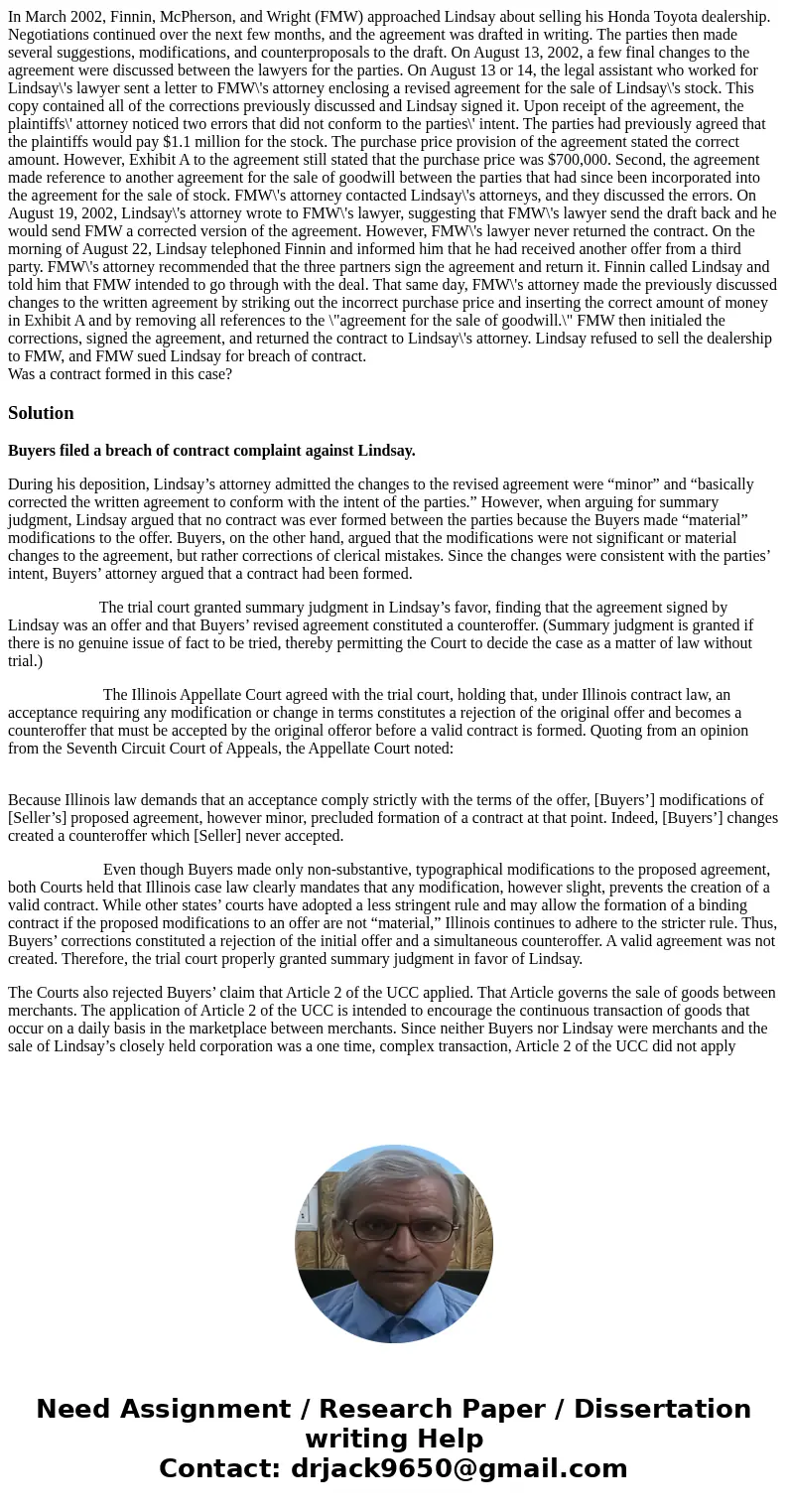In March 2002 Finnin McPherson and Wright FMW approached Lin
In March 2002, Finnin, McPherson, and Wright (FMW) approached Lindsay about selling his Honda Toyota dealership. Negotiations continued over the next few months, and the agreement was drafted in writing. The parties then made several suggestions, modifications, and counterproposals to the draft. On August 13, 2002, a few final changes to the agreement were discussed between the lawyers for the parties. On August 13 or 14, the legal assistant who worked for Lindsay\'s lawyer sent a letter to FMW\'s attorney enclosing a revised agreement for the sale of Lindsay\'s stock. This copy contained all of the corrections previously discussed and Lindsay signed it. Upon receipt of the agreement, the plaintiffs\' attorney noticed two errors that did not conform to the parties\' intent. The parties had previously agreed that the plaintiffs would pay $1.1 million for the stock. The purchase price provision of the agreement stated the correct amount. However, Exhibit A to the agreement still stated that the purchase price was $700,000. Second, the agreement made reference to another agreement for the sale of goodwill between the parties that had since been incorporated into the agreement for the sale of stock. FMW\'s attorney contacted Lindsay\'s attorneys, and they discussed the errors. On August 19, 2002, Lindsay\'s attorney wrote to FMW\'s lawyer, suggesting that FMW\'s lawyer send the draft back and he would send FMW a corrected version of the agreement. However, FMW\'s lawyer never returned the contract. On the morning of August 22, Lindsay telephoned Finnin and informed him that he had received another offer from a third party. FMW\'s attorney recommended that the three partners sign the agreement and return it. Finnin called Lindsay and told him that FMW intended to go through with the deal. That same day, FMW\'s attorney made the previously discussed changes to the written agreement by striking out the incorrect purchase price and inserting the correct amount of money in Exhibit A and by removing all references to the \"agreement for the sale of goodwill.\" FMW then initialed the corrections, signed the agreement, and returned the contract to Lindsay\'s attorney. Lindsay refused to sell the dealership to FMW, and FMW sued Lindsay for breach of contract.
Was a contract formed in this case?
Solution
Buyers filed a breach of contract complaint against Lindsay.
During his deposition, Lindsay’s attorney admitted the changes to the revised agreement were “minor” and “basically corrected the written agreement to conform with the intent of the parties.” However, when arguing for summary judgment, Lindsay argued that no contract was ever formed between the parties because the Buyers made “material” modifications to the offer. Buyers, on the other hand, argued that the modifications were not significant or material changes to the agreement, but rather corrections of clerical mistakes. Since the changes were consistent with the parties’ intent, Buyers’ attorney argued that a contract had been formed.
The trial court granted summary judgment in Lindsay’s favor, finding that the agreement signed by Lindsay was an offer and that Buyers’ revised agreement constituted a counteroffer. (Summary judgment is granted if there is no genuine issue of fact to be tried, thereby permitting the Court to decide the case as a matter of law without trial.)
The Illinois Appellate Court agreed with the trial court, holding that, under Illinois contract law, an acceptance requiring any modification or change in terms constitutes a rejection of the original offer and becomes a counteroffer that must be accepted by the original offeror before a valid contract is formed. Quoting from an opinion from the Seventh Circuit Court of Appeals, the Appellate Court noted:
Because Illinois law demands that an acceptance comply strictly with the terms of the offer, [Buyers’] modifications of [Seller’s] proposed agreement, however minor, precluded formation of a contract at that point. Indeed, [Buyers’] changes created a counteroffer which [Seller] never accepted.
Even though Buyers made only non-substantive, typographical modifications to the proposed agreement, both Courts held that Illinois case law clearly mandates that any modification, however slight, prevents the creation of a valid contract. While other states’ courts have adopted a less stringent rule and may allow the formation of a binding contract if the proposed modifications to an offer are not “material,” Illinois continues to adhere to the stricter rule. Thus, Buyers’ corrections constituted a rejection of the initial offer and a simultaneous counteroffer. A valid agreement was not created. Therefore, the trial court properly granted summary judgment in favor of Lindsay.
The Courts also rejected Buyers’ claim that Article 2 of the UCC applied. That Article governs the sale of goods between merchants. The application of Article 2 of the UCC is intended to encourage the continuous transaction of goods that occur on a daily basis in the marketplace between merchants. Since neither Buyers nor Lindsay were merchants and the sale of Lindsay’s closely held corporation was a one time, complex transaction, Article 2 of the UCC did not apply

 Homework Sourse
Homework Sourse